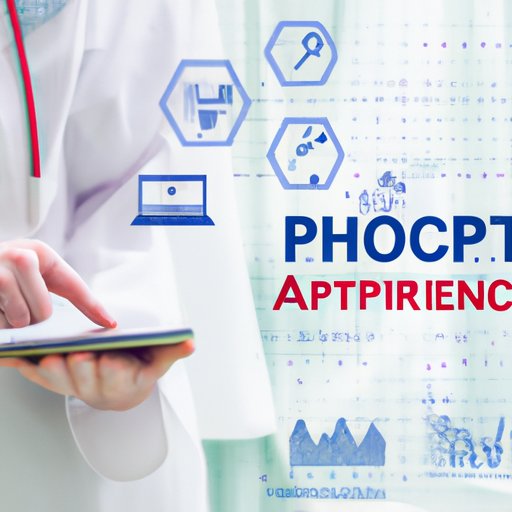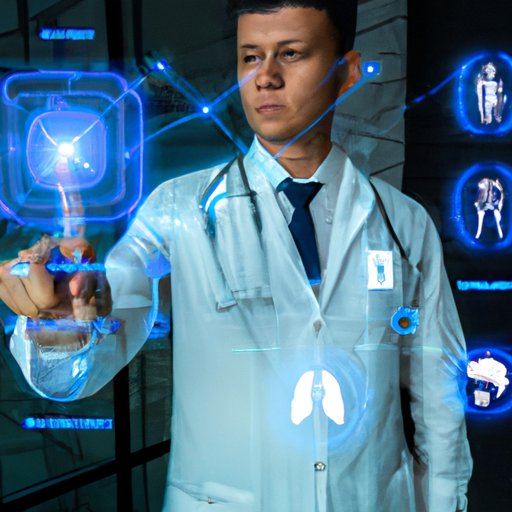Introduction
Data science is a field of study that focuses on collecting, organizing and analyzing large amounts of data to uncover patterns, trends and insights. It involves using advanced technologies such as artificial intelligence (AI), machine learning and natural language processing (NLP) to create models and algorithms that can be used to make predictions and recommendations. As the healthcare industry moves towards more evidence-based decision making, data science has become increasingly important in helping to improve patient outcomes and reduce costs.
Exploring the Use of Big Data in Healthcare
Big data refers to large datasets that can be used to generate insights into complex topics. In healthcare, big data can be used to identify trends in diseases, treatments, and patient outcomes. It can also help to identify risk factors for certain conditions and provide information about patient behaviors and preferences. According to a recent study from Health Catalyst, “big data in healthcare has been used to improve care quality, reduce costs, increase access to care, and improve patient engagement.”
The benefits of big data in healthcare are clear, but there are also challenges that need to be addressed when implementing it. One of the main challenges is data privacy and security, as healthcare data is often highly sensitive. Additionally, it can be difficult to ensure the accuracy and reliability of the data, as well as integrating it with existing systems. Despite these challenges, big data is becoming increasingly important in healthcare and offers great potential for improving patient outcomes.

Improving Patient Outcomes with Predictive Analytics
Predictive analytics is a type of data analysis that uses historical data to predict future outcomes. In healthcare, predictive analytics can be used to identify patients at risk of certain conditions or complications and intervene early to prevent them. It can also be used to forecast demand for resources such as beds and medical staff, and to personalize treatments based on individual patient characteristics.
According to a recent study by the Journal of Medical Internet Research, “predictive analytics has been used successfully to improve patient outcomes in areas such as cardiovascular disease, diabetes, and cancer.” For example, predictive analytics can be used to identify individuals at risk of developing type 2 diabetes and intervene early to prevent it. It can also help to identify patients who may benefit from specific treatments, such as chemotherapy for cancer, and enable physicians to make more informed decisions about care.
Leveraging Machine Learning for Health Monitoring
Machine learning is a type of artificial intelligence that enables computers to learn from data without being explicitly programmed. In healthcare, machine learning can be used to monitor patient health and detect abnormalities in vital signs such as heart rate and blood pressure. It can also be used to analyze imaging data, such as X-rays and CT scans, to detect anomalies or diseases.
According to a study published in the journal Nature Medicine, “machine learning has been used successfully to diagnose diseases such as cancer, detect anomalies in medical images, and predict patient outcomes.” For example, machine learning can be used to analyze medical images to detect tumors or other abnormalities, and to predict the progression of a disease. It can also be used to monitor patient vital signs and alert clinicians if any changes occur.

Applying Natural Language Processing to Clinical Notes
Natural language processing (NLP) is a type of artificial intelligence that enables computers to understand and interpret human language. In healthcare, NLP can be used to analyze patient records and extract useful information, such as diagnosis codes and treatment plans. It can also be used to generate insights from unstructured data, such as clinical notes and doctor’s orders.
According to a study published in the journal BMC Medical Informatics and Decision Making, “NLP has been used successfully to automate the extraction of information from clinical notes, predict patient outcomes, and improve the accuracy of diagnoses.” For example, NLP can be used to analyze patient records to identify potential errors in diagnosis and treatment, and to generate insights from clinical notes to inform research and improve patient care.

Utilizing AI for Diagnostics and Treatment Recommendations
Artificial intelligence (AI) is a type of computer technology that enables machines to perform tasks that normally require human intelligence. In healthcare, AI can be used to diagnose diseases and recommend treatments. It can also be used to analyze medical images and detect anomalies, such as tumors or fractures. Additionally, AI can be used to provide personalized health advice to patients based on their individual needs.
According to a study published in the journal Nature Reviews Clinical Oncology, “AI has been used successfully to diagnose diseases, recommend treatments, and improve patient outcomes.” For example, AI can be used to analyze medical images to detect tumors, and to recommend treatments based on individual patient characteristics. Additionally, AI can provide personalized health advice to patients based on their lifestyle and medical history.
Conclusion
Data science is playing an increasingly important role in the healthcare industry. By leveraging big data, predictive analytics, machine learning and AI, healthcare providers are able to improve patient outcomes and reduce costs. Big data can be used to identify trends in diseases and treatments, while predictive analytics can help to forecast patient outcomes. Machine learning can be used to monitor patient health, and AI can be used to diagnose diseases and recommend treatments. Finally, natural language processing can be used to analyze patient records and generate insights from unstructured data. Together, these technologies offer great potential for transforming the healthcare industry and improving patient care.
(Note: Is this article not meeting your expectations? Do you have knowledge or insights to share? Unlock new opportunities and expand your reach by joining our authors team. Click Registration to join us and share your expertise with our readers.)
